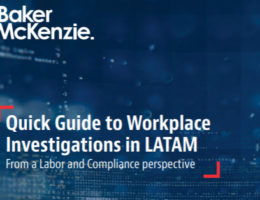Join Us at the 3rd Edition of the Latin America Healthcare and Life Sciences 360 Conference
We are excited to announce we will be joining the 3rd edition of the Latin America Healthcare and Life Sciences 360 Conference on May 6th in São Paulo. This event, organized by Trench Rossi Watanabe brings together key industry leaders and Baker McKenzie speakers to discuss the latest trends and developments in healthcare and life sciences.
The conference agenda promises a day full of insightful discussions on a variety of critical topics, including market expectations, regulatory changes, market access, data privacy, and ethical AI. Our roster of expert speakers will provide valuable insights and share their extensive knowledge on these subjects.
In addition to the stimulating sessions, attendees will have the opportunity to network with industry experts and peers. Don’t miss out on this chance to gain a deeper understanding of the healthcare and life sciences landscape in Latin America.
For more details and to register for the event, please click here. We look forward to seeing you there!







